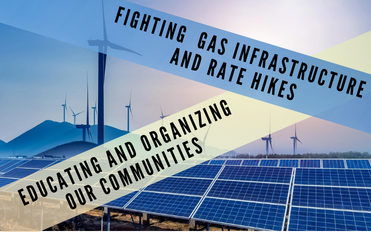For Immediate Release:
Contact:
Jessica Azulay, 917-697-4472, jessica@agreenewyork.org, Alliance for a Green Economy
Bob Cohen, (518) 265-6183, bcohen@citizenactionny.org, Citizen Action
New York – Thirty-six upstate elected officials have signed onto a letter opposing National Grid’s proposal to raise rates an average of $100/year for electric and gas customers. This rate hike would come at a time when many New Yorkers are already struggling to afford basic necessities. The company’s proposal also does not comply with New York’s new Climate Law.
National Grid is proposing to spend $1.4 billion on new fossil fuel infrastructure and to increase gas sales in its territory, which does not comply with the state’s Climate Leadership and Community Protection Act (CLCPA) mandated emissions reduction targets. The officials’ letter states that “the CLCPA mandates that the state achieve net zero emissions by 2050, necessitating an end to most fossil fuel use by that date. Yet, National Grid is proposing gas infrastructure with the assumption that it will be ‘used and useful’ past 2050.” The officials asserted that the proposed gas infrastructure is an imprudent use of ratepayer money because it would force customers to pay millions for assets that will inevitably become stranded.
Two weeks ago, the Public Service Commission (PSC) reaffirmed that rate case decisions must comply with the CLCPA. Meanwhile, the latest report from the UN’s Intergovernmental Panel on Climate Change (IPCC), which references thousands of scientific studies and has over 230 authors, contains clear evidence that fossil fuels must be cut back to avoid near-term climate catastrophe. The 1.5° Celsius global warming threshold that we must avoid crossing is imminent, unless we act quickly and decisively.
This rate hike would also worsen the energy debt crisis. As of June 2021, 253,535 residential and 12,914 non-residential upstate National Grid customers were 60 days or more behind on their bills, owing a total of over $408 million to the utility. Customers who self-certify to their utility that they have been financially impacted by the COVID-19 crisis are protected from shut-offs for now, but only until the end of this year.
National Grid, however, continues to make hefty profits. National Grid paid over $1 billion in dividends to shareholders in 2020. The company also continues to pay its top executives millions of dollars each year; for example, CEO John Pettigrew was paid $6.8 million in the 2019-20 year (more than $3,000 per hour). The COVID-19 pandemic has required New Yorkers to make one sacrifice after another. The thirty-six elected officials who signed this letter said they had hoped National Grid, an enormously profitable corporation, would demonstrate its commitment to our communities and its customers by making some sacrifices of its own.
Assemblymember Jon D. Rivera (District 149) said, “National Grid’s proposal to raise rates for customers is unconscionable and comes at a time when a global pandemic has turned even basic amenities into luxuries for some. Considering many cannot afford an increase in their cost of living, the idea of spending $1.4 billion on new fossil fuel infrastructure, at a time in which we must imminently turn away from non-renewable resources, is absurd. The recent report from the UN’s Intergovernmental Panel on Climate Change lays out a stark warning: we can no longer stop global warming from intensifying over the next three decades, but we can still act to slow its most damaging effects. Now is the time to embrace green energy sources, and well past time to abandon fossil fuels.”
Assemblymember John T. McDonald III (District 108) said, “At a time when most of our residents and small businesses are still struggling to get back on their feet, rate increases of this kind simply cannot be approved. We also must continue our strong commitment to the Climate Leadership and Community Protection Act and its goal for a decrease in fossil fuel use. We have to make this a priority in the coming years and encourage and reward energy conservation.”
Assembly Majority Leader Crystal Peoples-Stokes (District 141) said, “Supporting this letter to the Public Service Commission to reject the National Grid Upstate rate hike was an easy decision. While still in the midst of the COVID-19 pandemic, many individuals, families, and businesses continue struggling to make ends meet – this is not the right time to raise rates by almost $100 per year for the average customer. Additionally, we must heed the advice from environmental experts who recommend we move away from expanding fossil fuel infrastructure and instead move toward more environmentally-sustainable and renewable technologies.”
Senator Samra G. Brouk (NY-55) stated, “We’re living through a climate catastrophe, which, if left unaddressed, will create longstanding and costly damage to our communities. We cannot entertain conversations where those who profit off the use of climate-damaging fossil fuels ask for rate hikes on hard working people. We must move away from fossil fuels, for the good of our planet and our people. I urge the Public Service Commission to reject this rate hike and encourage companies like National Grid to pursue greener alternatives.”
Albany County Legislator Merton Simpson (District #2) said, “As a legislator that represents an Albany community with large numbers of low income residents and people of color, I hear all the time about people’s struggles to pay their utility bills and rent, while putting food on the table for their families, a struggle that’s been made worse by the COVID crisis. And in a time when the entire nation is experiencing extreme weather due to the climate crisis, it would be unconscionable for the Public Service Commission to approve the proposals in this rate case to expand gas infrastructure in upstate New York. We need to be expanding renewables like geothermal in our neighborhoods, not funding climate destruction.”
Albany County Legislator William Reinhardt (District #33) said, “The recent IPCC Report on the Climate Emergency could not be any clearer. We must stop building new fossil fuel infrastructure and expanding our dependence on Greenhouse Gas emitting fuels. Our only chance to avoid climate disaster is to rapidly reduce our direct use of fossil fuels in our buildings and vehicles and as a fuel to produce electricity. As we reduce our use of fossil fuels, we must ramp up the substitution of heat pumps and electric vehicles to heat and cool our buildings and power our vehicles. This process of beneficial electrification is what every electric utility in New York should be aggressively pursuing, along with sourcing all of their electricity supply from renewable energy sources coupled with strong demand side management and energy storage options to replace natural gas peaking units.”
Albany County Legislator Sam Fein (District #6) said, “The people cannot afford another utility rate hike and our planet cannot afford to expand our reliance on fossil fuels. We must reject this proposed rate hike.”
Assemblymember Pamela Hunter (District 128) said, “At a time when families are struggling to recover from the global pandemic, now is not the time to hike rates. It is especially concerning that the National Grid proposal includes new investment in fossil fuel infrastructure as extreme weather events become more common. Many of my constituents will not be able to afford increased rates and I encourage the Public Service Commission to disapprove of National Grid’s proposal.”
Assemblymember Anna Kelles (District 125) said, “The global collective of environmental scientists have established that humans are the cause of our current rate of climate change and that we are in a code red crisis. Not only do we need to stop any new natural gas buildout but all our effort should be put towards reducing our current consumption. These steps are non-negotiable if we want any hope of preventing the most severe climate outcomes that would make this planet uninhabitable for most human populations. In this context the National Grid Upstate proposal is unacceptable and undermines our established climate goals set into NY State statute.”

